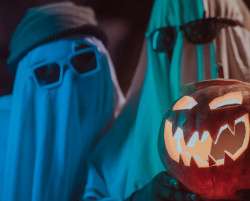
Originally published on metropolis.co.jp on March 2011

By Andrew Strasser
It’s been over four years since rocker Andrew W.K. last whipped Japanese audiences into a smiling sweat-soaked fury. Five prime ministers and one severe recession later, and the nation is in dire need of a dose of feel-good, fist-pumping anthem rock. So it comes as welcome news that the uber-genki musician, producer and TV host is bringing his propulsive party-machine to Tokyo, Osaka and Nagoya for next month’s Punkspring festival (see below). To celebrate his return, Universal Music will release a Japan-only EP of seven brand new songs—appropriately titled Party All Goddamn Night—at the end of the month.
“I think they’re all pretty intense,” Andrew tells Metropolis by phone from his home in New York. “I found more ways to get to that place of excitement.” With titles like “Everybody’s Raging” and “Head Bang,” the songs are a taste of what to expect with his next full-length album. Audiences at Punkspring will be able to hear at least one or two of them live.
Despite Andrew’s lengthy absence, Japanese fans have been well-fed with material from the man they lovingly dub “Aniki.” September 2009 saw the simultaneous release of 55 Cadillac, an album of experimental piano improvisations from Thurston Moore’s Ecstatic Peace! label, and Gundam Rock, a bombastic take on the music from the original animated series. In 2010, Andrew released a double CD, combining his 2006 Asia-only Close Calls With Brick Walls album with Mother of Mankind, a new disc of rare and unreleased tracks spanning his ten-year career.
But perhaps the most widely heard new work (and at the most deafening volumes) was last year’s “Kiba,” the theme for pachinko manufacturer Sammy’s highly anticipated new CR Souten no Ken machine. Written by former Megadeth guitarist Marty Friedman, the track features Andrew’s exuberant vocals (in both Japanese and English) accompanied by a humorously kawaii video of the two long-haired rockers. The song plays when you achieve the highest reward in the game, and according to Friedman, the machine can be found in every pachinko parlor in Japan.
“Kiba” was the culmination of a childhood dream for Andrew, who by his own admission has been fascinated with pachinko all his life. “My mom bought me a really good toy version… when I was 5 or 6 years old, and I was just obsessed with it,” he recalls. “Then, when I was around 13, I saved up… for over two years to buy a refurbished factory one, a really amazing elaborate one.”
That same year, Andrew and his family went on a two-week trip to Japan, where he and his 8-year-old brother spent their time sneaking into pachinko parlors and searching the floor for lost balls to put in the machines. “There was one time, though, where we got a little carried away,” he says. “We noticed these huge piles of balls in these plastic tubs.” Thinking they were extras, the boys tried to take some. “And then we got asked to leave,” he says with a chuckle.
These days, it’s difficult to imagine anyone in Japan asking the gregarious Andrew to get off the premises. Not after two electrifying performances at the 2002 and 2006 Summer Sonic festivals; sold-out concerts at huge venues like Club Quattro, Zepp Tokyo and Akasaka Blitz; and such frequent television appearances that (and I’ve witnessed this myself) he can’t even go into ramen shops without the cooks coming out to shake his hand.
I asked Andrew why he thought Japan had embraced him and his music so fervently. “I think maybe in a mystical way it happened because I was so obsessed with Japan,” he says. “If someone would have told me that even a fraction of what I’ve gotten to do in Japan was going to happen… that was all I would have ever wanted out of life.”
He also suggested that his popularity could come down to a shared belief in excitement for its own sake. “You get hooked to that feeling of being overwhelmed of being in… a blur of just excitement and joy,” he says, referring to a shared affinity for game centers and music. “That’s what I want out of life, out of entertainment—various states of intensity. And clearly Japan is all about that, so it’s just a natural fit.”
Andrew is, perhaps, too humble to mention that his first show in Japan took place just hours after being released from a Tokyo hospital, where he was treated for a violent stomach virus. Or that he played shows in support of his second album, The Wolf, from a wheelchair after breaking his ankle. Perhaps, more than anything else, it’s this ganbarou spirit that endears him to his fans in Japan.
It was by way of thanks to those fans that Andrew and his record label came up with the idea of an English-language J-rock covers album. Inspired by the success of “Son Nano Kankei Neh Rock,” a song based on comedian Kojima Yoshio’s then ubiquitous catchphrase that shot to No. 1 on the ring-tone charts, Japan Covers sees Andrew tackle 14 songs from a diverse group of artists, including J-punk heroes The Blue Hearts, Finger 5 (Okinawa’s answer to The Jackson 5), and contemporary artists like GReeeeN.
Yet for an artist accustomed to writing all his own music, the recording of Japan Covers and Gundam Rock presented unique difficulties. “What I wanted to come across on both those albums was that I’m just having a lot of fun… because I was. Getting to sing those songs and learn [them] was extremely challenging but very rewarding. I learned more about music from doing those two projects than I had in the last ten years total.”
So, are there any intrinsic differences between these Japanese songs and Western rock? “There did seem to be… some very hard-to-pin-down quality that they all had in common,” he replies. “Like [the music] was emerging from a different perspective, and that ended up becoming the most exciting thing about the project.”
The one thing Andrew wants to convey to Japan and its music lovers is his gratitude—he’s particularly thankful that his Japanese label, Universal, has pushed him to explore so many new avenues. “When someone believes you can do [a multitude] of things… you can do a lot more,” he says.
So, at Punkspring and with the new EP, fans can look forward to more: more intense music. More unbridled exuberance. And more extreme, over-the-top partying than ever before.
Punkspring 2011
One-day fest with Good Charlotte, Hoobastank, Andrew W.K., Suicidal Tendencies and others. Apr 3, 1pm, ¥8,400. Makuhari Messe, Chiba. Tel: Creativeman 0180-993-040.
Covering Up
J-pop cover albums are breaking out as fast as you can say “Big in Japan.” Next up: Spinal Tap?
By Dan Grunebaum
The Japan Covers, Andrew W.K. (2008, Universal) Party boy’s party-hard take on J-rock songs by The Blue Hearts and Tomoyasu Hotei
Covered -Winter-, Boyz II Men
(2010, Avex)
Tracks from Exile’s “Heavenly White” to Hikaru Utada’s “First Love,” covered in English by the vintage a cappella group
Ms. Vocalist, Debbie Gibson (2010, Sony)
Fit and fine at 40, the former teen queen scored a No. 1 on the international cable radio charts for her version of Yutaka Ozaki’s “I Love You.” In a word: retrolicious!
Tokyo Jukebox, Marty Friedman (2009, Avex)
The former Megadeth guitarist and current Shinjuku resident shreds songs by everyone from SMAP to Maximum the Hormone
Guilty Pleasures, Scott Murphy
(2006, In-n-Out Records)
The Chicago pop-punker rode his band Allister’s minor success in Japan to a second career as a J-pop star. See also Guilty Pleasures 2, 3 and 4 on Universal
Six Picks for Punkspring 2011
By Dan Grunebaum
SOMETHING OLD
 New York Dolls
New York Dolls
Before the Sex Pistols and the Ramones, there were the New York Dolls. With the leering David Johansen, Sylvain Sylvain and Johnny Thunders at its core, the group defined downtown New York’s early-’70s proto-punk scene. Reunited at the behest of singer Morrissey in 2006, the Dolls have just released the rather convincing Dancing Backward in High Heels.
 Dead Kennedys
Dead Kennedys
Masterminds of late-’70s hardcore, San Francisco’s DKs brought a sneering political irony into the scene. With songs like “Holiday in Cambodia,” singer Jello Biafra and guitarist East Bay Ray aimed to provoke and enrage—and were ultimately sued for putting penises on the cover of their 1985 album Frankenchrist. Breaking up in ’86, the DKs reformed in 2001 without Biafra, who was himself sued by the band’s other members.
 Suicidal Tendencies
Suicidal Tendencies
With frontman Mike Muir as the only permanent member, Suicidal Tendencies pioneered the crossover of punk with metal in the ’80s. Without them, there would have been no Metallica (a group that ST’s bassist, Robert Trujillo, went on to join). Suicidal Tendencies’ legacy was cemented with 1990’s Lights… Camera… Revolution!, while Muir is promising that the band’s first album of original material in a decade will arrive in 2011.
SOMETHING NEW
 Cerebral Ballzy
Cerebral Ballzy
After a decade of increasingly wan emo, pop-punk and post-punk revival, it was inevitable that something like these five kids from Brooklyn would come along. Voted by NME one of the 50 Best New Bands of 2010, Cerebral Ballzy drags punk back to where it started. If the atavistic fury of tracks like “Puke Song” provides a guide, they should produce one of Punkspring’s liveliest sets.
 Pretty Reckless
Pretty Reckless
Black eyeliner and bleach-blonde hair do not a punk band make—and Pretty Reckless are not punk. Nevertheless, in the form of Taylor Momsen, they’ve got the prettiest singer since Avril Lavigne came on the scene. Formed in 2009 and debuting with Light Me Up last summer, the New Yorkers cross Lavigne’s pop-punk with the chunky alt-rock of Evanescence.
 Automatic Loveletter
Automatic Loveletter
Also competing in the blonde punkette department will be Juliet Simms of Tampa, Florida, who created Automatic Loveletter with her brother Tommy in 2007. The sound is emo-tinged pop-rock, but as heard on last year’s Truth or Dare, Simms’ voice crackles with an emotion that just might even warm the giant antiseptic void that is Makuhari.







